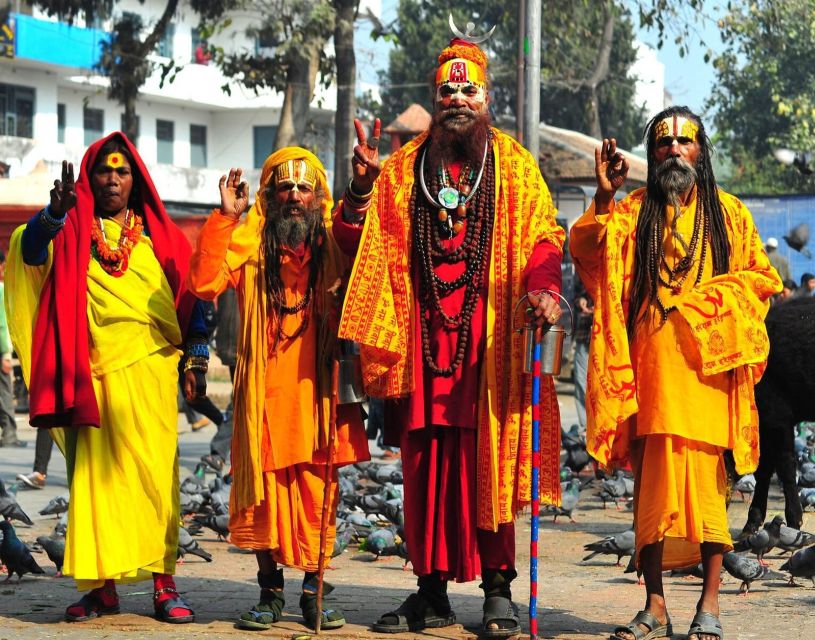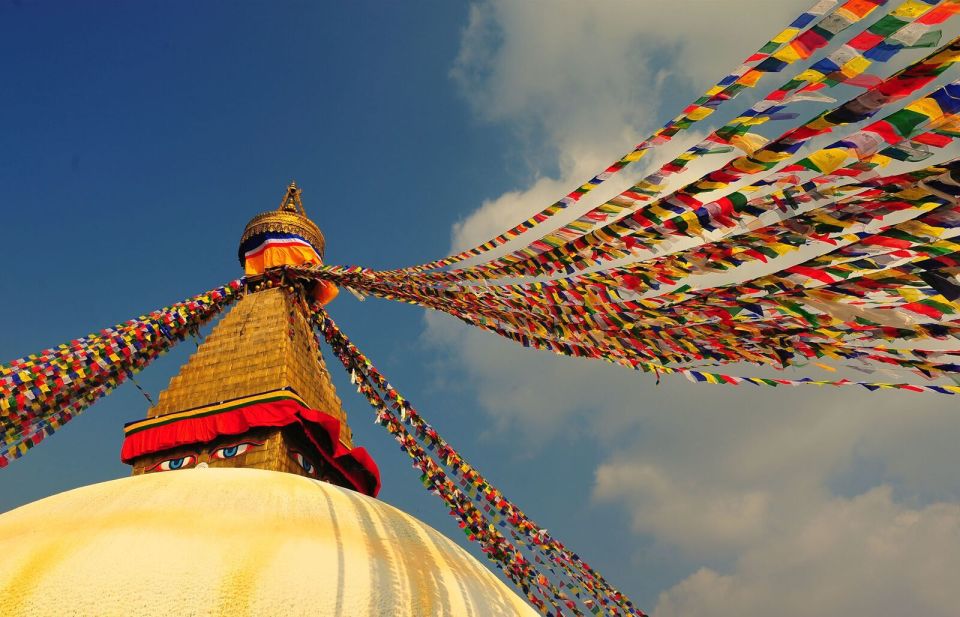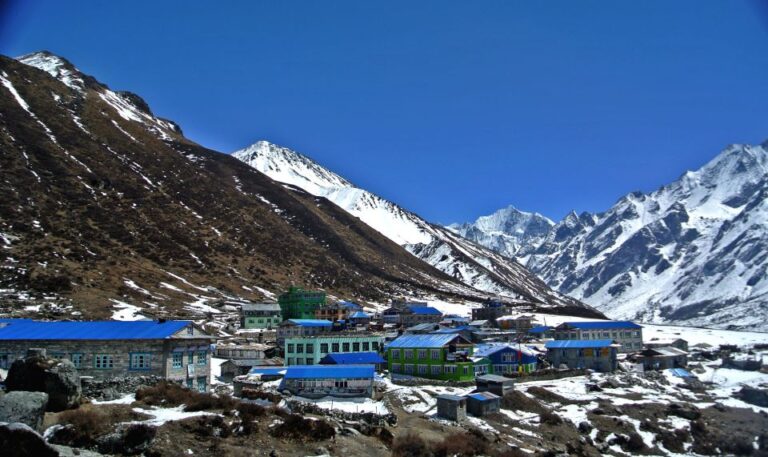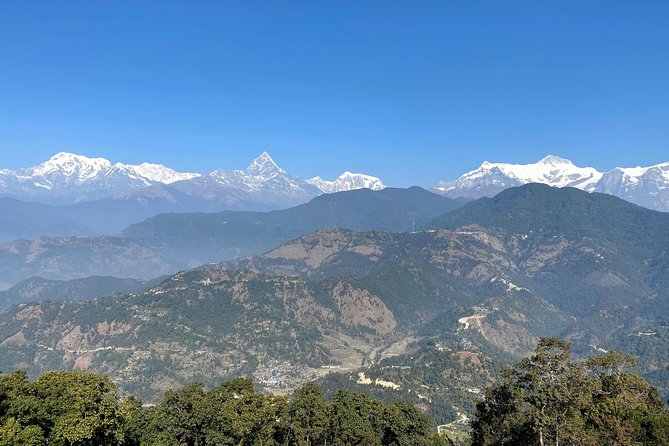Spiritual Nepal: Expert Insight Into Hinduism and Buddhism
Ever wondered what lies at the intersection of Hinduism and Buddhism in Nepal, a land where spirituality permeates every aspect of life?
With its ancient temples, vibrant rituals, and serene monasteries, Nepal offers a profound insight into these two influential faiths.
But how does one truly understand the depth of spiritual practices in this Himalayan nation?
The intricate tapestry of beliefs and traditions woven into the fabric of Nepalese culture is waiting to be unraveled, revealing a world where divinity and enlightenment converge harmoniously.
Good To Know

- Nepal embodies the spiritual fusion of Hinduism and Buddhism.
- Cultural traditions reflect deep religious roots.
- Experience enlightenment through rituals and festivals.
- Explore the harmonious blend of Hindu and Buddhist influences.
It's also worth checking out some other tours and experiences nearby.
Spiritual Significance of Nepal

Nepal holds a deep spiritual significance intertwined with the rich cultural tapestry of Hinduism and Buddhism, making it a sacred destination for seekers of divine wisdom and enlightenment. The country’s cultural traditions are deeply rooted in religious practices, creating a vibrant atmosphere where spirituality permeates daily life.
Nepal’s spiritual essence can be experienced through various rituals, festivals, and ancient customs that have been preserved for generations. Visitors have the opportunity to witness firsthand the harmonious blend of Hindu and Buddhist influences in the country’s art, architecture, and way of life.
The spiritual significance of Nepal goes beyond mere observation; it invites individuals to enjoy a profound journey of self-discovery and enlightenment within a unique cultural setting.
Hinduism in Nepalese Culture

Immersing oneself in Nepalese culture unveils a profound connection to Hinduism, a cornerstone of the country’s spiritual fabric. Hinduism’s influence is deeply woven into the cultural traditions of Nepal, shaping daily life, festivals, and rituals.
From the vibrant celebrations of Dashain and Tihar to the peaceful ambiance of meditation at ancient temples, Hindu beliefs permeate every aspect of Nepalese society. The reverence for deities like Lord Shiva and Goddess Durga is evident in the colorful shrines that adorn streets and homes.
Pilgrimages to sacred sites such as Pashupatinath Temple and Muktinath hold significant spiritual importance for locals and visitors alike, embodying the rich tapestry of Hindu heritage within Nepalese culture.
Buddhism: Path to Enlightenment

Embarking on the journey towards enlightenment, Buddhism in Nepalese culture intertwines with daily practices and spiritual pursuits, offering a serene path for seekers of wisdom.
Meditative practices form the cornerstone of this spiritual tradition, guiding individuals on their enlightenment journey through introspection and mindfulness. Nepal, with its rich Buddhist heritage, provides a conducive environment for practitioners to delve deep into meditation and self-discovery.
The serene ambiance of temples and monasteries in Nepal fosters a sense of tranquility, aiding in the pursuit of inner peace and enlightenment. Through the practice of meditation and contemplation, you can embark on a profound spiritual journey towards understanding the nature of existence and attaining higher states of consciousness.
Sacred Sites in Kathmandu
Amidst the bustling streets and vibrant culture of Kathmandu, lie sacred sites that beckon travelers to explore the spiritual heart of the city. Visitors can enjoy the rich cultural traditions and local customs by visiting key locations such as the revered Pashupatinath Temple, the majestic Boudhanath Stupa, and the ancient Swayambhunath Stupa. These sites not only offer a glimpse into the religious practices of Hinduism and Buddhism but also serve as focal points for communal gatherings, rituals, and meditative practices. By experiencing these sacred sites firsthand, travelers can gain a deeper understanding of the spiritual significance embedded in the daily lives of the Nepalese people.
| Sacred Sites in Kathmandu | ||
|---|---|---|
| Pashupatinath Temple | Boudhanath Stupa | Swayambhunath Stupa |
Rituals and Practices in Nepal
Exploring Nepal unveils a tapestry of diverse rituals and practices deeply entrenched in the country’s cultural tapestry. Nepalese traditions are rich with ceremonies that reflect the blend of Hinduism and Buddhism. From elaborate puja rituals in homes to grand festivities like Dashain and Tihar, the Nepalese calendar is filled with religious customs that bind communities together.
One of the most significant practices is the offering of light, known as Aarati, performed at temples like the Pashupatinath Temple. Plus, pilgrimage sites such as the Boudhanath Stupa hold special importance, where rituals are carried out with reverence. These rituals and practices not only uphold ancient customs but also provide a glimpse into the spiritual essence of Nepal.
Spiritual Insights From Local Experts
Local spiritual experts in Nepal offer profound insights into the intertwined realms of Hinduism and Buddhism, enriching visitors’ understanding of the spiritual landscape.
These experts, deeply rooted in local traditions, share valuable knowledge about spiritual customs that have been passed down through generations. Through engaging conversations and immersive experiences, they provide a unique perspective on the spiritual practices observed in Nepal.
Visitors have the opportunity to explore the essence of Hinduism and Buddhism, gaining a deeper appreciation for the interconnectedness of these belief systems. By learning from these local experts, travelers can explore the rich tapestry of spiritual wisdom that defines Nepal’s cultural identity.
Eco-Friendly Spiritual Experiences
Taking in the spiritual tapestry of Nepal, travelers can now embrace eco-friendly practices intertwined with profound spiritual experiences. Nepal offers a unique opportunity for culture while promoting sustainability through eco-friendly practices.
From participating in carbon-neutral tours to visiting sacred sites like the Pashupatinath Temple and Boudhanath Stupa, visitors can witness the beauty of Nepal while treading lightly on the environment. Engaging with local communities and learning about their spiritual beliefs not only enriches the traveler’s experience but also fosters a deeper understanding of the interconnectedness between culture and nature.
Here's a few more nearby tours and experiences we think you'll like.
Frequently Asked Questions
What Is the Best Time of Day to Visit the Pashupatinath Temple for a More Spiritual Experience?
For a more spiritual experience at Pashupatinath Temple, the best time is early morning for morning meditation and witnessing sacred rituals. Sunset also offers serenity and a spiritual ambiance. Both times provide unique insights into Hinduism and Buddhism.
Are There Any Specific Rules or Customs to Follow When Participating in the Aarati Ritual at the Temple?
When participating in the Aarati ritual at the temple, visitors should adhere to ritual etiquette and participation guidelines for a meaningful experience. Engage in culture and respect temple practices by dressing conservatively and observing the ceremony respectfully.
How Can Visitors Respectfully Interact With Holy Hindu Men at the Pashupatinath Temple?
Visitors at Pashupatinath Temple can respectfully interact with holy Hindu men by observing and following local customs. Respecting traditions and engaging in culture are key. Approach with reverence, seek permission, and show genuine interest.
Is There a Specific Significance or Meaning Behind the Architecture of the Boudhanath Stupa?
The architecture of Boudhanath Stupa holds deep significance, symbolizing the five elements and the stages of enlightenment. Visitors experience a spiritual journey through its sacred design, fostering cultural etiquette and respect for Buddhist traditions.
Are There Any Specific Sustainable Practices or Initiatives Implemented by the Eco-Certified Operator During the Tour?
During the tour, the eco-certified operator focuses on sustainable tourism by implementing eco-friendly practices and community engagement. Participants can experience culture while contributing to the preservation of the environment and local communities.
Not for you? Here's more of our most recent tour reviews happening neaby
- Upper Mustang Trekking – 15 Days
- Everest Helicopter Tour: Experience the Ultimate Aerial Adventure of a Lifetime
- 12 Days Annapurna Circuit Trek
- Private Half-Day Off-Road Safari in Shivapuri-Nagarjun Park – Kathmandu
- Nepal Multisport Adventure Tour
- 7 Days Honeymoon Tour in Nepal
- Nepal Cultural & Adventure
- Bandipur Homestay Tour
- Tibet Tour With Everest Base Camp – FLY IN DRIVE OUT- 8 DAYS
- Day Hiking Near Kathmandu Valley.
- 4 Days Langtang Valley Short Trek
- 12 Days Everest Base Camp Trek in Nepal
- Lobuche East Peak Climb With Everest Base Camp Trek
- 4-Day Kathmandu Valley UNESCO World Heritage Sites Tour
- UNESCO World Heritage Site Tour in Kathmandu
The Sum Up
Enjoy the spiritual wonders of Nepal with expert guidance into the realms of Hinduism and Buddhism.
From the sacred rituals at Pashupatinath temple to the serene atmosphere of Boudhanath Stupa, this journey offers a unique opportunity to explore the rich cultural tapestry of Nepal in an eco-friendly and sustainable way.
Discover the essence of ancient traditions and gain spiritual insights from local experts on this enlightening adventure through the heart of Nepalese spirituality.





